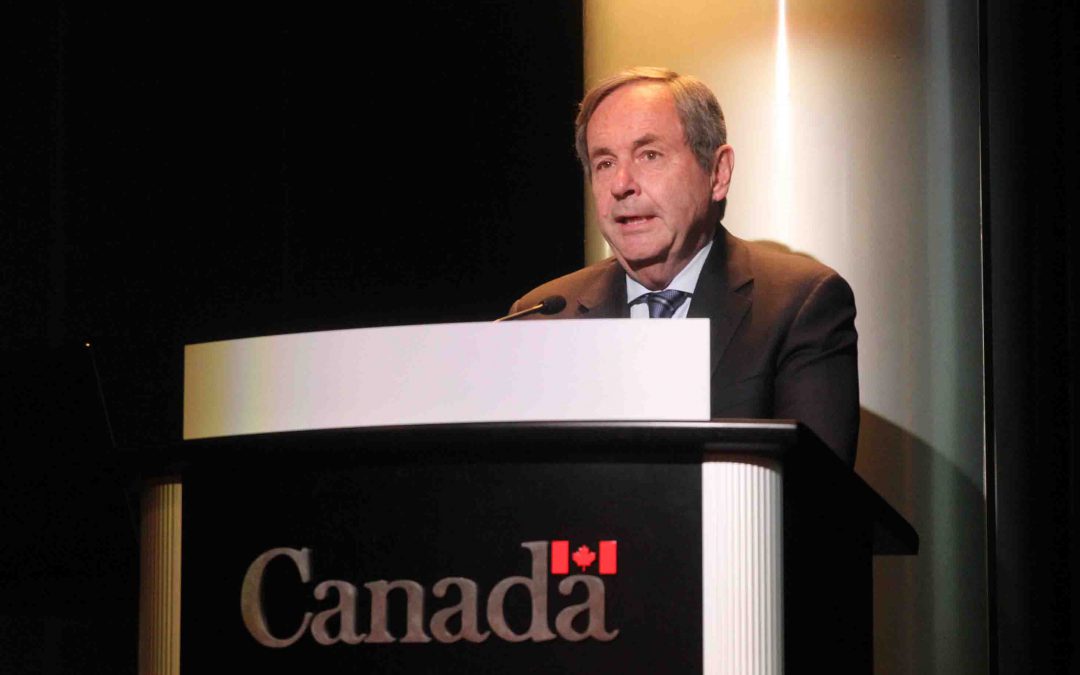WASHINGTON — Canada is “fully confident” that it will receive permanent exemptions on aluminum and steel tariffs from the U.S. despite “challenging” trade negotiations, David MacNaughton, Canada’s ambassador to the U.S., said Thursday night.
“I continue to be hopeful that we will have a permanent exemption,” MacNaughton told attendees of the Society of Advancing Business Editing and Writing’s 2018 Spring Conference at the Embassy of Canada.
President Donald Trump imposed global tariffs of 25% on steel and 10% on aluminum last month but exempted Canada and Mexico until May 1. The president will decide whether to continue suspensions past that date based on discussions addressing U.S. national security, the White House said in a press release.
“If Canada’s a national security threat to the United States of America,” MacNaughton said in jest, following laughter from the audience, “Then, give me a break.”
The ambassador said Canada found it “strange” that America’s northern neighbor was caught in the middle of the dispute over metal tariffs. He added that it felt like the U.S. was punching Canada “in the nose” while trying to punish countries in the Far East.
Canada is the U.S.’s second-largest goods trading partner, following China. The United States ran a trade deficit of $23.2 billion in goods with Canada last year, according to the U.S. Census Bureau.
MacNaugton cautioned the U.S. against using next week’s approaching deadline for a tariff extension as leverage in ongoing talks to renegotiate the North American Free Trade Agreement.
“We don’t acknowledge that there’s any linkage to NAFTA,” he said.
The United States Trade Representative released objectives in July for the NAFTA renegotiation, specifically aiming to reduce trade deficit and save American jobs. Trump said in a tweet last August that the NAFTA pact between Canada, Mexico and the U.S. was the “worst trade deal ever made,” and threatened to leave the agreement.
The ambassador revealed that the U.S. hasn’t given up demanding a “sunset clause” in the NAFTA agreement that would allow any of the three countries to automatically terminate the pact every five years. That would “create a degree of uncertainty” that is unnecessary to the NAFTA community, MacNaughton said.
MacNaughton also told reporters that Americans started with a domestic content rule of 50% in autos, which means at least half of the material in a car or light truck made in the region must be from America to be able to enter the marketplace without tariffs.
“We couldn’t accept that,” said MacNaughton, who had just returned from a grueling three-and-a-half-hour negotiation at the USTR, adding that he “would’ve scheduled a root canal for the end of the day in order to ease the pain.”
Canada rejected the change in rules of origin because auto manufacturers will have to replace their suppliers with U.S. companies to meet new requirements, said Euijin Jung, research analyst at Peterson Institute for International Economics. The change will disrupt the sophisticated supply chains that have been developed in North America, she said.
“In general, higher regional value content will raise cost of production and pass it down to consumers eventually,” Jung said in an email interview, adding that she did not think reaching a new NAFTA deal by early May is feasible with so many issues unresolved.


